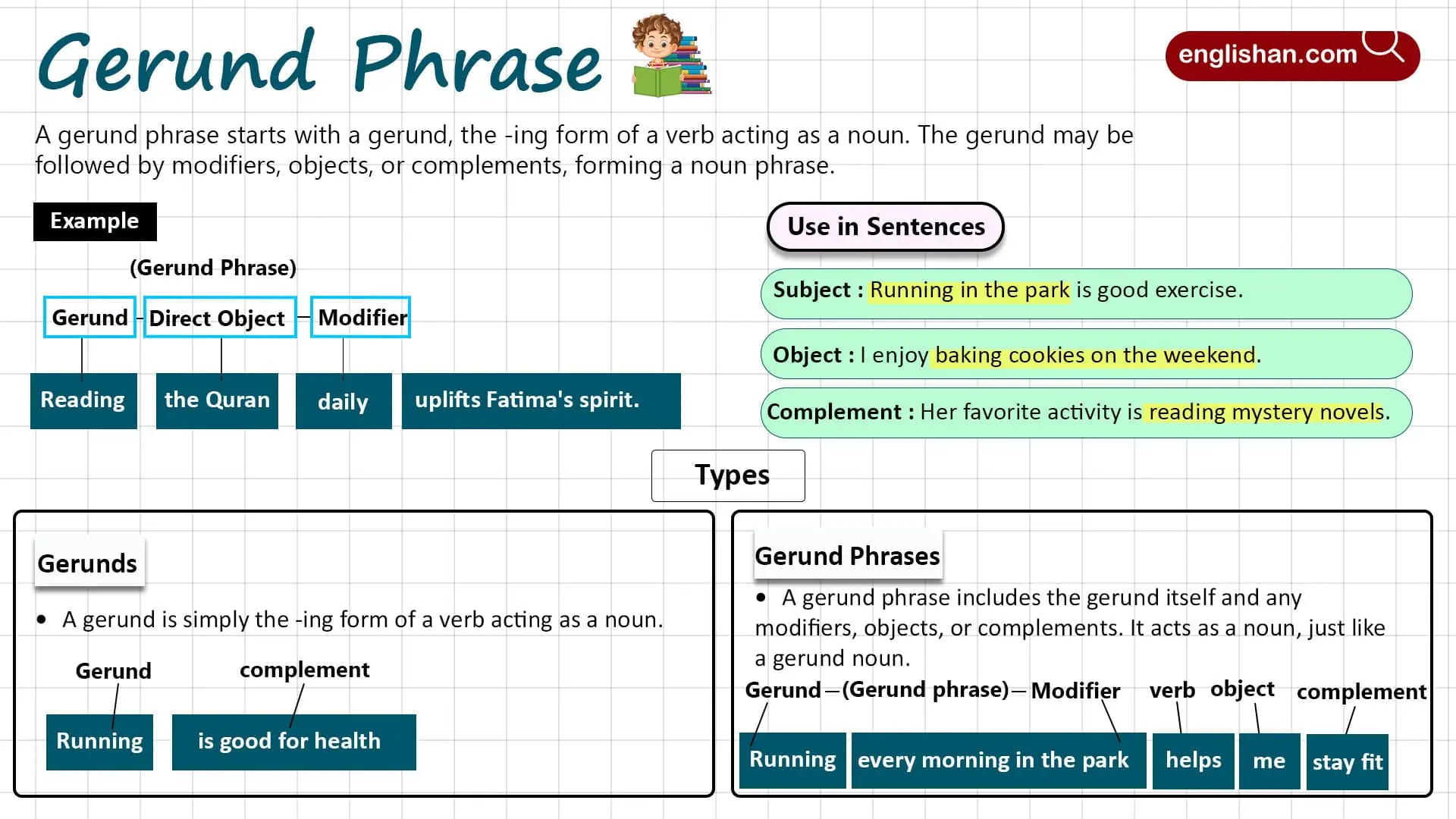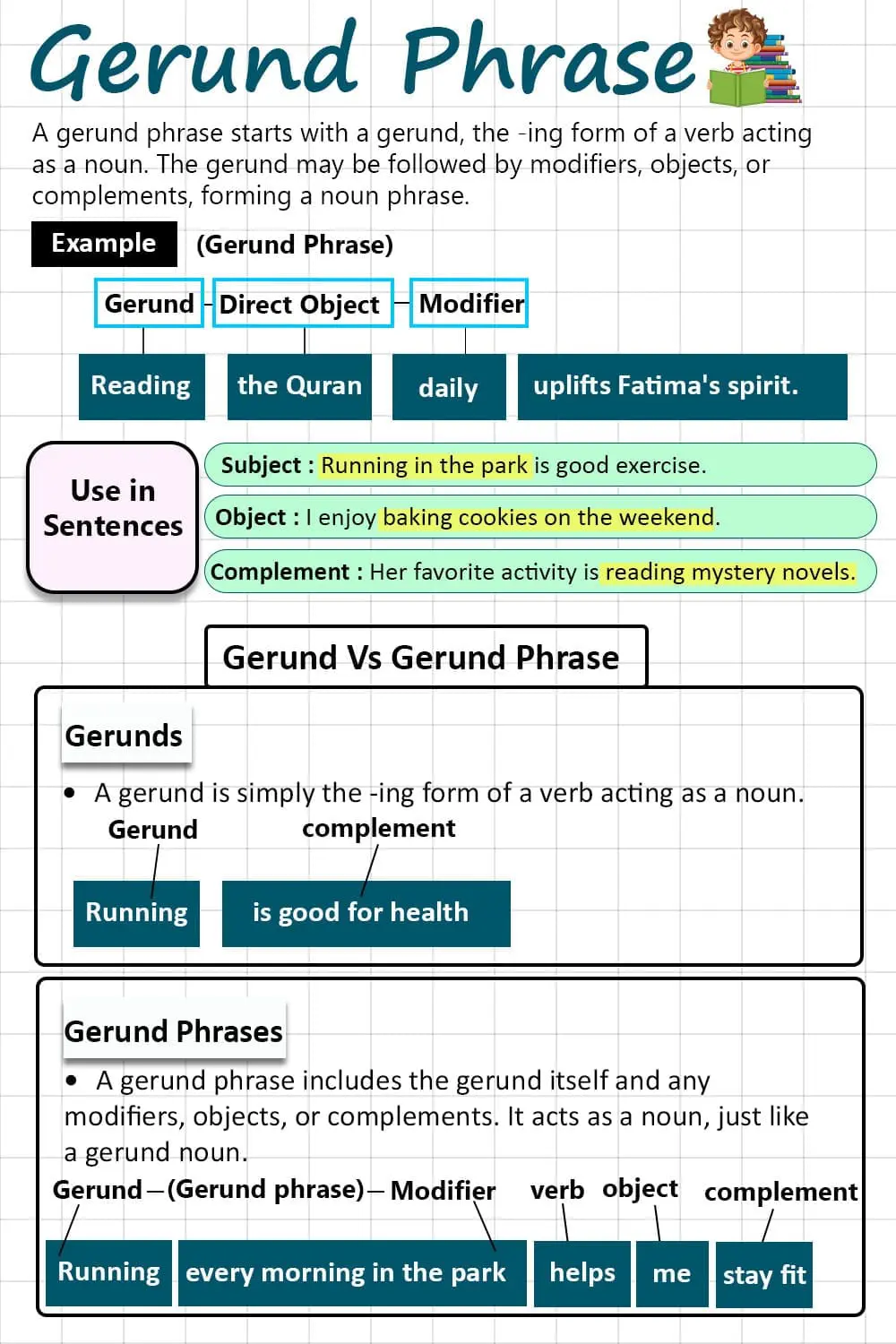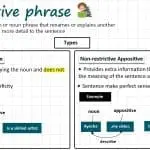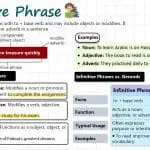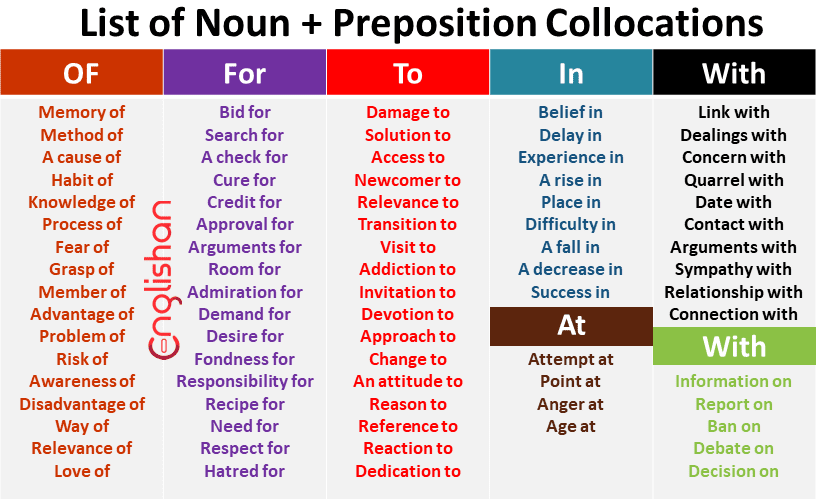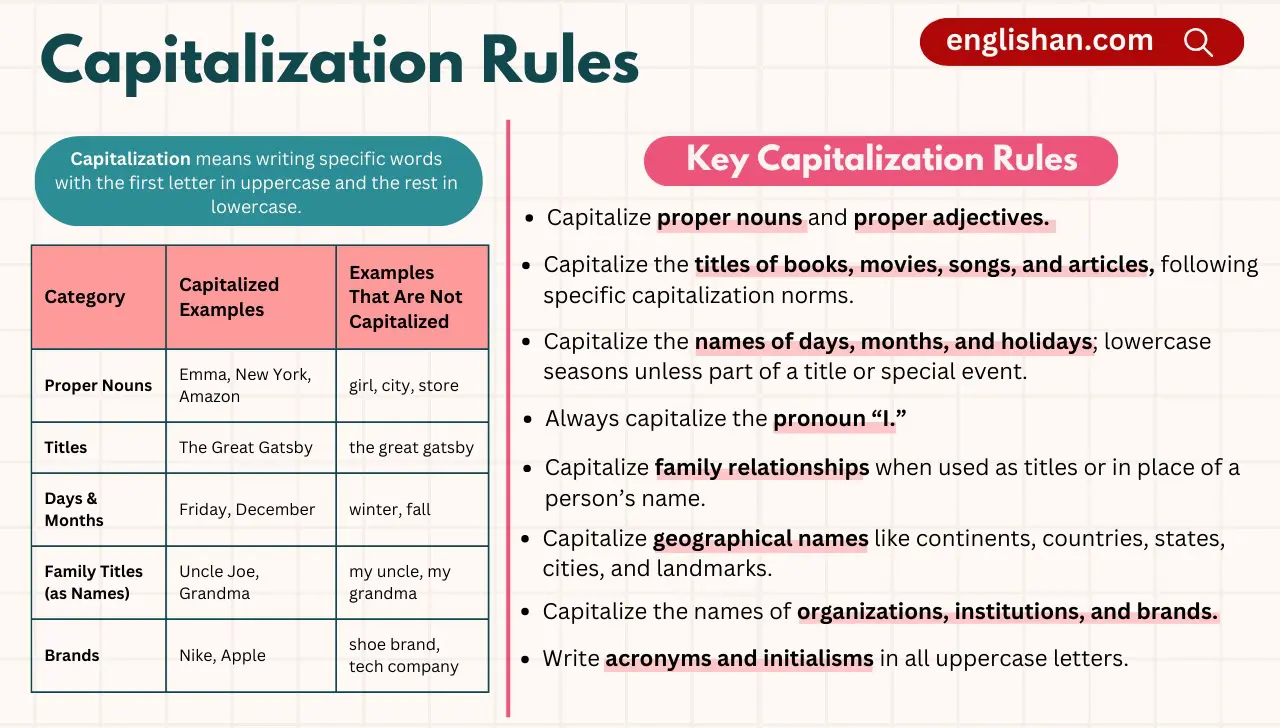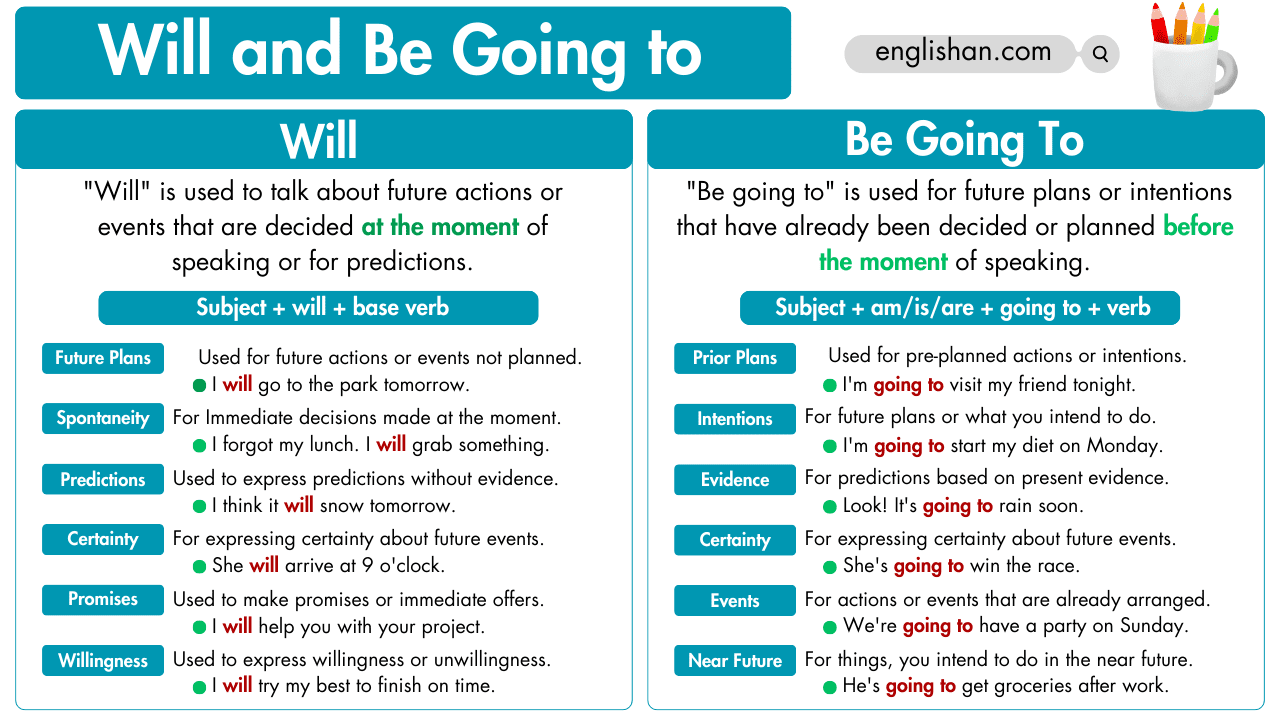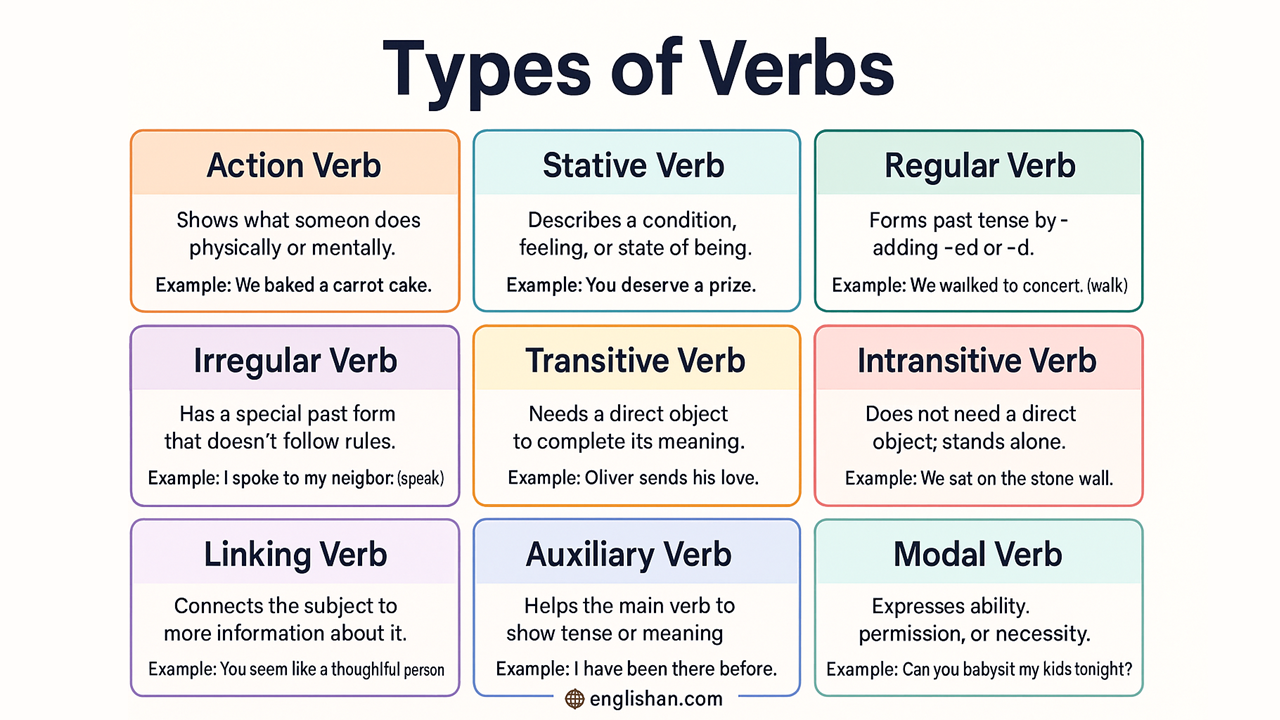In this blog post, you will understand what a gerund phrase is and how it functions in sentences. A gerund phrase consists of a verb ending in -ing along with its modifiers or objects, acting as a noun in a sentence. It can serve different roles, such as a subject, object, or complement, making English sentences more expressive and structured. Learning how to identify and use gerund phrases will improve your fluency and writing skills.
For more grammar lessons, visit our grammar category.
What is a Gerund Phrase?
A gerund phrase begins with a gerund, which is the -ing form of a verb, and includes any modifiers or objects that complete its meaning. These phrases act as subjects, objects, or complements in a sentence, just like a noun.
Here’s how gerund phrases work:
- Subject: Running in the park is great exercise.
Here, running in the park is the subject of the sentence, not just running. - Object: I enjoy running every morning with my friends.
In this case, running every morning with my friends is the object of the verb enjoy. - Complement: My favorite activity is running long distances.
The phrase running long distances describes the subject, activity.
Gerund phrases give more detail and help to enrich the meaning of sentences, while still functioning as nouns.
Gerund Phrase Examples
Let’s explore some more examples to clarify the concept:
- Walking to the mosque every morning is refreshing.
- Learning English grammar can be challenging but rewarding.
- Playing football with friends is one of Ahmed’s favorite activities.
- Teaching the class made Ali realize his passion for education.
In all these examples, the -ing verb is functioning as a noun and the entire phrase forms a subject or an object in the sentence.
Structure of a Gerund Phrase
The basic structure of a gerund phrase includes:
- Gerund (verb + ing): This is the main component.
- Modifiers and/or complements: These can be adjectives, adverbs, or prepositional phrases that add more detail to the gerund.
For example:
- Eating biryani with family is a cherished tradition.
- Gerund: Eating
- Complement: Biryani
- Modifier: With family
Another example:
- Studying in the library helps students focus.
- Gerund: Studying
- Modifier: In the library
Difference between Gerunds and Gerund Phrases
- A gerund is simply the -ing form of a verb acting as a noun.
- Example: Running is good for health.
- A gerund phrase expands on that by adding modifiers, objects, or complements.
- Example: Running every morning in the park helps me stay fit.
The key difference is that while the gerund is a single word, a gerund phrase includes additional information that makes the action clearer or more specific.
Use of Gerund Phrases in Sentences
Below are examples using Muslim names to illustrate how gerund phrases work in sentences:
- Praying five times a day is important for Bilal. ✅
- Teaching children to read is Fatima’s passion. ✅
- Writing letters to friends keeps Maryam connected to her loved ones. ✅
- Cooking delicious meals for family gatherings is Ali’s favorite thing to do. ✅
- Reading the Quran every morning gives Ayesha peace. ✅
These sentences show how gerund phrases can function as subjects or objects, making them integral to sentence structure.
How to Identify Gerund Phrases
To identify a gerund phrase, follow these steps:
- Find the verb ending in -ing.
- Check if it acts as a noun. If it’s acting as the subject or object of the sentence, it’s likely a gerund.
- Look for modifiers or objects attached to the gerund. If the verb is followed by additional information, that’s part of the gerund phrase.
For example, in “Ali enjoys playing basketball after school,” the gerund is “playing,” and the entire phrase “playing basketball after school” functions as the object of the verb “enjoys.”
Common Mistakes
There are some common mistakes learners make when working with gerund phrases:
- Using a gerund where a participle is needed:
- Incorrect: Eating pizza quickly, the man finished the race. ❌
- Correct: Eating pizza quickly made him feel full. ✅
- Forgetting that gerunds act as nouns:
- Incorrect: Driving to the store, we saw many birds. ❌
- Correct: Driving to the store took longer than expected. ✅
Summary
A gerund phrase is an important part of English grammar that helps convey more specific details about actions acting as nouns. Understanding how gerund phrases function and how to identify them is crucial for mastering English sentence structure. By keeping in mind their basic structure, you’ll be able to recognize and use gerund phrases easily in your writing and speaking.
FAQs
A gerund phrase starts with a gerund (-ing verb acting as a noun) and may include modifiers, objects, or complements. It functions as a noun in sentences.
Examples:
1. Subject: Swimming in the ocean is fun.
2. Object: She enjoys reading books.
3. Object of a Preposition: They talked about traveling abroad.
4. Subject Complement: His hobby is playing guitar.
5. Appositive: Her goal, winning the race, motivates her.
Here are examples of gerunds used in sentences:
1. Running is my favorite hobby. (Subject)
2. She enjoys painting. (Object)
3. They talked about traveling. (Object of a preposition)
4. His passion is writing. (Subject complement)
5. We avoided arguing. (Object of the verb)
The formula for a gerund is:
Verb + -ing = Gerund
Examples:
Swim + -ing = Swimming
Read + -ing = Reading
Dance + -ing = Dancing
A gerund acts as a noun in a sentence.
Here are the main types of phrases in simple terms:
1. Noun Phrase: Acts as a noun.
Example: The big house is beautiful.
2. Verb Phrase: Contains a verb and helpers.
Example: She is writing a story.
3. Adjective Phrase: Describes a noun.
Example: The girl with curly hair smiled.
4. Adverb Phrase: Describes a verb, adjective, or adverb.
Example: He ran very fast.
5. Prepositional Phrase: Starts with a preposition.
Example: She sat on the bench.
6. Gerund Phrase: Starts with a gerund (-ing word acting as a noun).
Example: Reading books is fun.
7. Infinitive Phrase: Starts with “to” + verb.
Example: To play soccer is exciting.
8. Appositive Phrase: Renames a noun.
Example: My dog, a golden retriever, loves treats.
Read More
